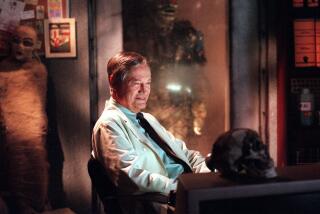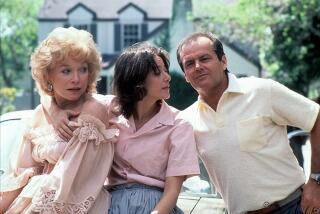‘Devil and Miss Jones’ Takes Up Cause of Depression’s Downtrodden
- Share via
During the Depression, the rich took it on the chin from Hollywood movies. As did many other films of the time--”Citizen Kane,” “Dodsworth,” “Meet John Doe,” “My Man Godfrey,” “Midnight” and “Easy Living” to name a few--”The Devil and Miss Jones” doesn’t pull any punches in assailing American capitalism. In fact, it goes even further, stridently calling for a united work force.
A few years later, those became fighting words for Joe McCarthy and his ilk and resulted in the widespread Hollywood blacklisting after World War II. But in 1941, it was just good old rich-bashing, screwball-comedy style.
What makes this film stand out are inspired performances by two of the cinema’s greatest comedy stars, Jean Arthur and Charles Coburn. As John P. Merrick, the reclusive “richest man in the world,” Coburn gets himself hired at one of his stores to ferret out those behind the union movement. He immediately finds himself assigned to the slipper counter and under the thumb of a heartless boss played to the hilt by Edmund Gwenn (who went on to play Kris Kringle in “Miracle on 34th Street”).
Arthur is Miss Jones, the shoe saleswoman who takes Coburn under her wing and even uses his fabricated story as a victim of the system as the basis for a passionate plea to workers gathered at a union meeting.
The supporting cast of “The Devil and Miss Jones” is filled with sparkling performers, including Spring Byington as a saleswoman who is paired off with longtime bachelor Coburn; William Demarest as one of the store’s house detectives and S.Z. (Cuddles) Sakall as Coburn’s befuddled butler.
The irony of Arthur’s trying to “help out” Coburn as he works to bust the union movement plays out amusingly, despite the histrionics of Robert Cummings as Arthur’s boyfriend and the main organizer of the workers. Cummings’ ranting reaches an intolerable level when he begins reciting the Preamble to the Constitution in protest of the police’s mistaken arrest of Coburn.
“The Devil and Miss Jones” comes to a rousing conclusion with a Marx Brothers-like scene inside the store manager’s office (deftly handled by director Sam Wood, who previously directed a pair of Marx Brothers films) and the big negotiation sit-down in which Coburn tries to play both sides of the table.
If this Norman Krasna script leans a bit heavily on the comedy cliches of mistaken identity and the “reformed” rich capitalist, its lines are that much better spoken by Coburn and Arthur, actors who always manage to mold original, believable and very funny characters.
“The Devil and Miss Jones,” (1941). Directed by Sam Wood. 92 minutes. No rating.
More to Read
Only good movies
Get the Indie Focus newsletter, Mark Olsen's weekly guide to the world of cinema.
You may occasionally receive promotional content from the Los Angeles Times.









